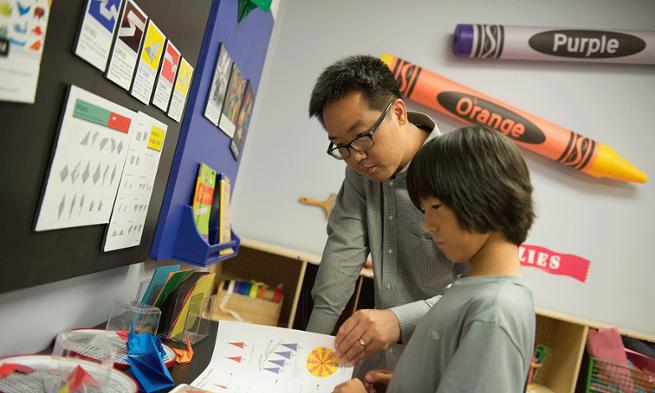The education of Dr. Woo
Education
By Martha Bell Graham
Different approaches to education
In an era when discussions about education swirl around "common core" and "standards" and "testing," Isaac Woo, professor of communication studies in the College of Arts and Letters, offers some perspective on the great debate.
"[Korean students should consider JMU.] They would benefit more here."When Isaac Woo came to the United States as a college junior and enrolled at Illinois State University, he brought with him the experience of growing up in an education system touted as the example that the United States should emulate. That suggestion, however, makes Woo uncomfortable. "I'm a little bit worried about Obama saying that we should look like the Korean system."
Instead, Woo has discovered a part of American education that he admires, and that he finds JMU does very, very well.
Can education be too intense?
Like American parents, Korean parents want the best for their children. But in Korea, education is more about results than process, Woo explains. They want the best teachers and push children to more hours of learning. As a result, they stew in what Amanda Ripley, author of The Smartest Kids in the World—And How They Got That Way, calls a "Korean pressure cooker" of academic rigor. After school, students begin activities that can run to 10 p.m. Social pressure and parents' desire to see children succeed create an increasingly intensive learning environment for children. "It is killing children," says Woo, who holds degrees from Illinois State, Indiana State and the University of Alabama at Tuscaloosa.
In Korea, he says, students are expected to respect their teachers. While he thinks that has merit, it's requires, fostering little interaction between teachers and students. Here, especially at JMU, he has found that when students praise or thank a teacher it is very genuine.
Learning that lesson was tough initially for Woo. "My first semester [at JMU] was brutal," he says. He realized students could not always relate to him in his public relations and research methods classes. There was a distance he wasn't aware of until student evaluations at the end of the semester landed on his desk. "It was really hurtful," he says with candor.
But Woo took it as a challenge.
With the help and guidance of his colleagues—whom he praises for their support—he published his schedule on Google Docs and let his students sign up for appointments—or they could drop by his office. "As a student [in Korea], I didn't feel that kind of engagement," he says.
While teaching at the University of Wisconsin-Stevens Point, prior to coming to JMU, Woo received much pedagogical training. "We learned how to teach," he says. "One thing I bought into is that we aren't education majors. Knowing subject matter doesn't automatically make one a good teacher."
At JMU, Woo found more help through the Center for Instructional Technology and the Center for Faculty Innovation, specifically "jmUDesign," a program run by CFI. During the five-day course, which emphasized creating curriculum and student objectives, he says: "What struck me was that [they] put emphasis on students."
The challenge, and benefit, of engagement
Educated in the Korean system where there is strong delineation of roles—and little interaction between teacher and student, except along strict pedagogical lines—Woo found JMU quite different.
As a university, JMU is "very unique and engaging. I've found myself staying in my office all the time," he says. "I like it."
So much so, he wishes more native-born Korean students would consider JMU. Currently, the university has few students who enroll directly from Korea, drawn instead to universities with more storied reputations. Those who choose JMU usually come after attending high school in Northern Virginia. But Woo says Korean students should consider JMU. "They would benefit more here."
As a scholar, Woo is challenged by the conflicting responsibilities of research and JMU's commitment to stellar teaching. Woo, however, has embraced it. How does he do it? "I work more here," he says, obviously pleased with the outcomes.
One of those outcomes stems from JMU's penchant for community engagement and Woo's practice of it: as a member of Public Relations Council of the Shenandoah Valley—and as a dad visiting a fire department display with his son. Woo made contacts that have benefited both the community and his students. One such opportunity came to fruition when Woo and his students assisted Harrisonburg's Explore More Discovery Museum and the Harrisonburg Police Department by developing public relations campaigns for each.
Reforming education—making it the best it can be—is far more complex that enacting stricter standards for students and teachers or requiring longer school days and school years, Woo would contend. It requires understanding the education process, students and teachers in a way that draws on their strengths.
As a parent himself now, Woo likes the aspect of strong involvement ineducation and in the community. "If we are connected to the community," he says, "our students have more opportunities."
And so does Woo, whose semester-end student evaluations are no longer hurtful—but affirming.
